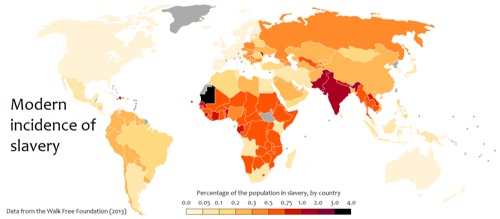JEWISH THOUGHT OF THE DAY
Happy Meals, Jewish-Style

Unless you’re reading this in a third-world country, you have more choices about what to eat – and likely eat considerably more every day – than 99.9% of the human beings who ever walked the face of the earth.
Even a time-traveler from only a mere century ago, taken for a tour of a typical supermarket today, and then to a simple restaurant for a meal, would be dumbfounded at the sight of what’s available on the shelves and on the menu.
And those of us living now? Meh. We’re not so impressed. We’re busy plodding on our hedonic treadmills, taking our bounty of food for granted and casually overindulging in it even as we stay on the lookout for new food adventures to try to keep things exciting.
Ironically, though, despite – or, perhaps, because of – all our available gastronomic pleasures (and expanding waistlines), we rarely, if ever, experience the delight that our time-traveler experienced in the early 1900s when he suddenly found himself in possession of, say, a can of tuna. A hamburger was probably something closer to heaven.
Which brings us to the fact that there’s something – and something Jewish, too, as it happens – to be said for willfully denying ourselves foods, at least at times.
Recent research, in fact, has provided evidence that temporarily giving up something pleasurable may provide a route to greater delight in the deferred treat when it’s finally enjoyed.
Participants in a study published last year in Social Psychological and Personality Science were asked to eat a piece of chocolate on two occasions, a week apart. During the week, one group was assigned to eat as much chocolate as possible; a second group, to eat none at all; and a third group, the control, was given no particular instructions. Those in the second group, perhaps unsurprisingly but significantly, reported enjoying the end-of-week chocolate more, and experiencing a more positive mood when consuming it, than either of the other groups.
The great medieval Jewish sage Maimonides counseled something most modern nutritionists would agree with, and most of us today would do well to adopt: eating only when hungry and, even then, not eating to full satiation. Now there’s a diet that, whatever you decide to eat, is pretty much guaranteed to keep you fit.
What you eat, of course, is important too. Whole grains, vegetables and fruits are what experts say should make up the bulk of our daily food. Meat, sweets and fats, not so much.
As it happens, it is clear from a number of passages in the Talmud that, while eating meat is permitted by Judaism, it was eaten back then – and, presumably, meant to be eaten – as a sort of relish to accompany bread, any meal’s mainstay. It is unlikely that a steak would have been regarded by the rabbis of old as a meal unto itself (even with vegetables on the side). Meat, in fact, was considered a special food, one with which to honor the Sabbath and holidays.
The author of the classical Jewish moral treatise the “Peleh Yo’etz,” first published in Constantinople in 1824, advises against eating meat (unless one’s health requires it – a rare situation these days) other than on such special occasions.
Now there’s a thought. Reserving meat and sweets and other less-than-healthy delectable indulgences for the Sabbath will not only benefit our health but, simply because they are abstained from the rest of the week, make us, when we do indulge in them, happier eaters.
Sabbath, in fact, is a day that Judaism teaches us to honor, in particular by reserving the nicest things we have – whether clothing or dishes or foods – for it. Even physical pleasures are rendered holy when indulged in on the Sabbath. In olden days, Jews would scrimp the entire week to be able to afford a piece of fish or meat for the Sabbath.
The Talmud tells how the great sage Shammai, when he found some special delicacy in the marketplace, would purchase it and put it aside for the Sabbath.
Imagine – no, consider – taking meat and baked sweets off your menu for weekdays, and making them part of your honoring of the Sabbath. Your enjoyment of the foods will be intensified, and it will yield benefits to your health, physical and spiritual alike.
Subscribe to our blog via email or RSS to get more posts like this one.
Posted in:
Hot Topics
by
Rabbi Avi Shafran
![]() December 17, 2015
December 17, 2015
Slavery… Today

Every Passover, Jews read passages from the Haggadah that tell us to visualize ourselves as former slaves who were just freed from the bondage. To some, the request seems antiquated. In the modern mind, slavery has become obsolete, a relic of some bygone era. Right?
Think again! Studies suggest that there are more slaves today than at any previous point in history… as much as 27 million!
The modern form of slavery can be found in every country, even the United States. The US State Department estimates that 17,500 slaves are smuggled in the US annually! They may be forced to do difficult farm labor or to attend to their master in his home, just like the slaves of old.
Of course, slave trading is officially barred by international law. Since 1817 more than 10 international treaties have been signed to outlaw transactions involving slaves. Illegal as it may be, though, slavery continues to be practiced – often with the tacit consent of corrupt authorities.
In India slavery is camouflaged under the mantle of “paying off a debt.” A wealthier farmer may lend a minimal sum to an indigent neighbor, whose son or daughter will be handed over to work off the debt. Their term of indemnity will be “as long as it takes to pay off the debt” – usually, that means forever.
Not only will the child remain enslaved for life, but should they marry and have children, those children are born into the bondage as well. In this manner a family can be enslaved indefinitely for generations to pay off a minor loan taken out by the great-grandfather. In practice, entire villages can be trapped in endless servitude.
There are countries around the world where people are drafted into slavery by powerful organizations, or even by the government itself. Several African countries use the services of forced child soldiers. In South America slaves are forced to harvest crops which are the sold to industrial countries. A large percentage of these laborers are children who were kidnapped and then sold as though they were objects.
In Pakistan young ones are forced to weave carpets. In Ivory Coast kids are beaten and starved on the cacao plantations. In Egypt or other Arab lands maintaining slaves remains a common practice.
Within hours of the terrible earthquake that struck Haiti in January 2010, criminal groups swarmed into the devastated country. Slavery had been a problem before the earthquake but suddenly skyrocketed. Similarly, the tsunami that struck in the Indian Ocean in 2004 not only left 300,000 dead and millions more without a roof, it also left some of those millions at the mercy of kidnappers.
The bottom line is that slavery continues today on a grand scale.
Until about 20 years ago, world leaders denied the problem existed, certainly not on the grand scale it is recognized today. (The International Labour Organization estimates that in 2005 the international trade in humans reached a monstrous $32 billion!)
A significant step in the right direction took place in 2000 when President Bill Clinton signed into law the Victims of Violence and Trafficking Protection Act. In 2012, President Obama signed an executive order to help the US government enforce its zero-tolerance policy against human trafficking.
Be that as it may, slavery is very much alive and well in the modern world. We should not take our freedom for granted. This Passover, pause for a moment and acknowledge how literally true it is that “If God had not taken our fathers out of Egypt, we and our children and grandchildren would still be enslaved.”
Subscribe to our blog via email or RSS to get more posts like this one.
Posted in:
Hot Topics;
Jewish Beliefs & Philosophy
by
Yaakov Astor
![]() March 19, 2015
March 19, 2015
Love

Love is best expressed by that which you do not do.
Hillel the Elder said this when he summed up the entire Torah,
“If you do not like something, don’t do it to someone else.”
What is it that you most dislike?
You don’t appreciate when someone pries into your faults, underlining each one with a red pen.
So if you truly wish to express love to someone else, don’t even look at his faults.
Find whatever is good about him and talk about that.
- Tzemach Tzedek
Subscribe to our blog via email or RSS to get more posts like this one.
Posted in:
Jewish Beliefs & Philosophy
by
Member of the Tribe
![]() October 2, 2013
October 2, 2013
The Mighty Peanut

Ralph Kramden, the world’s most famous bus driver, was a contestant on the popular “$99,000 Answer” show (not to be confused with the “$64,000 Question” show). He had already won the $600 prize and was about to go for the grand prize. When his wife pleaded with him to take the $600 he scoffed, “Six hundred dollars? Peanuts, peanuts. What am I gonna do with peanuts?” To which his loving wife Alice calmly replied, “Eat ‘em, like any other elephant”.
Of course, due to the excitement of the moment, Alice was taking a very narrow view of the potential uses of peanuts. Had she really thought about it, she would have realized that Ralph would have many more uses for his winnings:
If Ralph was a farmer instead of a bus driver, he surely would have planted peanuts as an alternate to his annual wheat crop to replenish the lost nutrients in his soil.
If he were a printer, he could have used peanuts as a cheap source of blue ink.
If he were modeling for Gentleman’s Quarterly magazine (not likely) or Alice needed some beauty help, he could have made some cosmetics out of peanuts.
Still brushing up on his bus driver’s test? He could use peanut coffee to help him stay awake. He could even lighten his coffee with peanut milk – a nutritious, inexpensive substitute for dairy milk.
Want something to eat with his coffee? Bake a cake or cookie with peanut flour.
Need to clean up after himself? Peanut soap.
In the mood for pizza? No, sorry, nothing substitutes for a great marinara sauce, but why not use peanut cheese?
George Washington Carver, one of America’s greatest inventors (died 1943), claimed he came up with more than 300 uses for peanuts.
For me, nothing beats a peanut butter and jelly sandwich on a tasty slice of peanut bread.
Got (peanut) milk?
Subscribe to our blog via email or RSS to get more posts like this one.
Posted in:
by
Max Anteby
![]() August 25, 2013
August 25, 2013
Star of David origin

“But You God are a shield for me…” (Psalms 3:4). David refers here to God as being his ‘shield’. This brings us to the topic of the ‘Magen David’, [lit. shield of David] popularly know as ‘the Star of David’, and regarded as a symbol of Judaism. Strangely, there is no mention of this symbol or its meaning in any authoritative Jewish book.
Rabbi Moshe Feinstein, in Igros Moshe (Orach Chaim Vol. 3, Res. 15) tells us that the most convincing source for this sign is David himself. For it is clear that David did not find security in battle from any armor or shield. Only in God did he find himself securely enveloped, invulnerable from every side - above and below, east, west, north, south, - six directions in all. Thus the six-pointed symbol stands for David’s true shield - God! Rabbi Feinstein concludes that for this reason this symbol, hallowed by centuries of traditional usage, should be respected, because it is meant to symbolize the eternal Jewish faith in God no matter what the adversity.
origin: Psalms - Vol. 1, Artscroll Tanach Series
Subscribe to our blog via email or RSS to get more posts like this one.
Posted in:
Jewish Beliefs & Philosophy
by
Member of the Tribe
![]() June 14, 2013
June 14, 2013
A Stormy Sprinkle

Countless lines have been written about Hurricane Sandy, the storm that recently battered the eastern coastal states of the U.S. How to prepare, how to repair and how to react has been the subject of articles in newspapers and magazines spanning the nation. There are lessons to be learned by governments, individuals and emergency crews about how to understand what insurance companies called “an act of God”.
Here is another.
Living on the scenic Jersey coast, we were not unaffected by the damage wrought by the storm. In addition to homes, cars, businesses and sources of recreation being destroyed, hundreds of trees fell in the tornado force winds. A study was recently conducted to determine – what caused some to fall while others, of the same type and age, remained?
Certainly those in exposed areas on top of hills or isolated areas were more likely to succumb to the high winds. But there was one glaring difference of the ones that fell in residential areas. Those that fell were primarily near homes that had lawn sprinkler systems as opposed to those without sprinklers.
That seems to be counter-intuitive.
You would think that a tree that received life giving water twelve months a year would outlast ones subject to seasonal rain and snow.
But that’s not what happened. Here’s why.
Life strives to be self-sustaining. Animals forage for food instinctively. Plants and vegetation naturally stretch out their roots in search of water and nutrients. When it is supplied daily, like by those homes that have sprinklered lawns, the roots remain short. When it is scarce, the roots stretch out far and wide searching for water and in the process, build a strong, stable foundation.
We see the same behavior on a human level. When people are handed sustenance on a silver platter, they become uninspired to reach out and better themselves. When encouraged, or even forced, due to circumstances, to fend for themselves, their natural instincts to survive come to the fore. They grow stronger and more stable.
Sprinkled support when needed is a benefit. Long term support might be a short-sighted approach and the root problem of a coming storm.
Subscribe to our blog via email or RSS to get more posts like this one.
Posted in:
Jewish Beliefs & Philosophy
by
Max Anteby
![]() May 2, 2013
May 2, 2013
Three Degrees of Separation

Sociologists have confirmed that if you speak to enough people about enough people, someone is going to know someone who knows someone who ultimately knows you. No matter where you are in the world, we are only separated by seven levels.
Microsoft actually proved it statistically and came out with 6.6.
(Close enough).
But even though there are seven levels, there are really three degrees.
Number one is physical. Physical objects are separated in time and space. As far away as the table is from the chair, that’s exactly how far away the chair is from the table. When one moves closer or farther away, the level of separation is exactly the same for both objects.
Not necessarily so in the second degree. In relationships, one person can feel very close and connected to another while the other party remains cold and aloof, or perhaps even oblivious. This holds true many times in dating – he/she can’t wait for the other party to call and the other can’t imagine why. Parents generally always feel emotionally connected to their children even though the child may be physically distant across the country somewhere and never calls. (Which reminds me I have to call my mother).
The third degree is spiritual. The Kaballah tells us that similarity of spirits equals closeness. Married people with shared goals, business partners with a common vision or leaders working for the betterment (or detriment) of mankind feel a spiritual kindred that transcends emotion.
When we exhibit Godlike traits such as kindness, caring, giving, nurturing, correcting or forgiving, our spirits become ONE with our Creator.
You can’t get closer than that.
Subscribe to our blog via email or RSS to get more posts like this one.
Posted in:
Jewish Beliefs & Philosophy
by
Max Anteby
![]() February 28, 2013
February 28, 2013


